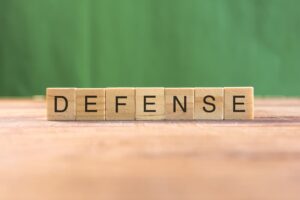How to Choose the Best Military Defense Attorney
If you or a loved one faces military legal issues, it’s time to find the right military defense attorney. Whether you’re dealing with a court-martial, administrative separation, or other military legal matters, an experienced and knowledgeable military defense attorney can make all the difference in the outcome of your case.
Understanding Military Law

Before diving into the specifics of choosing a military defense lawyer, it’s essential to understand the unique aspects of military law.
The Uniform Code of Military Justice (UCMJ) governs the legal system within the U.S. Armed Forces. This code outlines the rights and responsibilities of service members and establishes the procedures for military courts and tribunals.
Military law differs from civilian law in several ways. For example, certain acts that might not be considered crimes in the civilian world, such as disobeying a superior officer’s orders, can lead to serious consequences in the military.
Additionally, the military justice system operates independently from the civilian court system, with its rules, procedures, and potential penalties.
Given these differences, work with an attorney who has extensive experience and knowledge of military law.
Qualities to Look for in a Military Defense Lawyer
When searching for the best military defense attorney, consider several key qualities:
Experience in Military Law
When facing military legal issues, choose a defense attorney with extensive experience handling cases within the military justice system. An attorney who has spent years in military law will deeply understand the UCMJ, the rules and procedures governing military courts, and the potential consequences of various offenses.
Look for an attorney who has successfully represented service members in cases similar to yours. This can include cases involving similar charges, such as drug offenses, sexual assault allegations, or insubordination.
An experienced attorney will be familiar with the strategies and arguments that are most effective in these types of cases and will know how to build a strong defense tailored to your specific circumstances.
In addition to their knowledge of the UCMJ, an experienced military defense attorney will also understand military culture and the unique challenges that service members face.
They will understand the chain of command, the importance of maintaining good order and discipline, and the potential impact of legal proceedings on a service member’s career and prospects.
An attorney with substantial experience in military law will also have established relationships with key players in the military justice system, such as prosecutors, judges, and commanding officers.
These relationships can be beneficial when negotiating plea deals, seeking favorable treatment for their clients, or advocating for alternative resolutions to legal issues.
Knowledge of Your Branch of Service
While the UCMJ governs all branches of the U.S. Armed Forces, each branch has its own unique culture, traditions, and legal nuances. When choosing a military defense lawyer, work with someone with specific knowledge and experience in your branch of the service.
An attorney who has worked extensively with service members in your branch will have a deeper understanding of the specific challenges and pressures you may face. They will understand your branch’s operational tempo, deployment cycles, and training requirements and how these factors can affect legal proceedings.
For example, an attorney with experience representing Army soldiers may better understand the unique stressors and challenges faced by those serving in ground combat roles. They may know the Army’s administrative separation process or the specific regulations governing Army personnel.
Similarly, an attorney with experience representing Navy sailors may better understand the unique legal issues that can arise during sea duty or port visits. They may also be more familiar with the Navy’s administrative separation process or the specific regulations governing Navy personnel.
By choosing an attorney with specific knowledge of your branch of service, you can ensure that your legal representative deeply understands the context in which your case unfolds. This can lead to more tailored and effective legal strategies and a greater likelihood of achieving a favorable outcome.
Strong Communication Skills
Effective communication is the foundation of any successful attorney-client relationship. When facing military legal issues, choose a defense attorney who possesses strong communication skills and is committed to informing and involving you throughout the legal process.
Look for a patient and empathetic attorney, an active listener who takes the time to understand your unique situation, concerns, and goals. They should recognize the stress and uncertainty often accompanying legal proceedings.
A skilled communicator can explain complex legal concepts and strategies in a way that is easy to understand, using plain language rather than confusing legal jargon. They should openly discuss your case’s strengths and weaknesses, potential outcomes, and the risks and benefits of various legal options.
Throughout the legal process, your defense lawyer should keep you informed of any developments in your case, such as court dates, plea negotiations, or changes in strategy. They should be responsive to your questions and concerns, providing timely and thorough answers to help you make informed decisions about your case.
In addition to their communication with you, a military defense attorney with strong communication skills will also effectively advocate on your behalf. They can articulate your case clearly and persuasively to prosecutors, judges, and other key players in the military justice system.
Availability and Responsiveness

When facing military legal issues, time is often of the essence. Choose an available and responsive defense attorney who will prioritize your case and be there for you when you need them most.
During your initial consultation, ask the attorney about their availability and responsiveness. Will they be accessible outside regular business hours in case of emergency or urgent developments? Do they have a policy for returning phone calls and emails within a certain timeframe?
An attorney who is difficult to reach or slow to respond can add unnecessary stress and uncertainty to an already challenging situation. You want to work with someone who values your time and concerns and is committed to providing prompt and attentive service.
In addition to their responsiveness to you, it’s important to consider an attorney’s availability for court appearances, meetings with prosecutors, and other key events in your case. An attorney overloaded with cases or frequently double-booked cannot devote time and attention to your case.
When evaluating an attorney’s availability and responsiveness, look for someone with a track record of being accessible and reliable. Ask for references or testimonials from past clients who can speak to the attorney’s communication and availability throughout their legal proceedings.
Reputation and Recommendations
One of the best ways to gauge the quality and effectiveness of a military defense attorney is through their reputation and recommendations from past clients and colleagues.
When researching potential attorneys, look for reviews, testimonials, and case studies that speak to their skills, experience, and dedication to their clients. These materials can provide valuable insights into an attorney’s success track record, approach to client service, and ability to navigate the military justice system effectively.
In addition to online reviews and testimonials, consider seeking recommendations from trusted sources within the military community. This could include other service members who have faced similar legal issues, military legal assistance offices, or veterans’ organizations.
Recommendations from people with firsthand experience with a particular attorney can be especially valuable, as they can speak to the attorney’s communication skills, responsiveness, and ability to achieve favorable outcomes in real-world cases.
When evaluating an attorney’s reputation and recommendations, look for consistent themes and patterns. Do multiple clients and colleagues speak to the attorney’s skill, professionalism, and dedication? Do they have a track record of success in cases similar to yours?
Reputation and recommendations can indicate an attorney’s quality, but make your decision on other considerations. Meet with potential attorneys in person, discuss your specific case and concerns, and evaluate their communication skills and approach to client service directly.
By considering an attorney’s reputation and recommendations in conjunction with other key factors, such as their experience, knowledge, and communication skills, you can make an informed decision and choose the best military defense attorney for your needs.
Preparing for Your Initial Consultation
Once you’ve identified potential military defense attorneys, the next step is to schedule an initial consultation. This meeting allows you to discuss your case, ask questions, and determine whether the attorney fits your needs.
To make the most of your consultation, consider:
Gather Relevant Documents
When preparing for your initial consultation with a military defense attorney, gather all relevant documents related to your case. This may include charge sheets, which outline the specific allegations against you, and any investigation reports that provide details about the circumstances surrounding the alleged offense.
If witness statements are available, bring those along as well, as they can provide valuable insights into the case.
Having these documents readily available during your consultation will allow the attorney to quickly grasp the key aspects of your case and provide more accurate and targeted advice.
They can review the evidence, identify potential weaknesses in the prosecution’s case, and formulate a defense strategy tailored to your unique situation.
In addition to legal documents, you may also want to bring any relevant personal records, such as performance evaluations, awards, or character references. These materials can help paint a more complete picture of your military service and character, which can help when seeking a favorable resolution to your case.
Prepare a List of Questions

Before your initial consultation, take the time to write down a list of questions you want to ask the military defense attorney. This will ensure that you cover all the important topics and get the information you need to make an informed decision about your legal representation.
Some key questions to consider include:
- How much experience do you have handling cases similar to mine?
- What is your track record of success in military legal matters?
- What strategies do you typically use in cases like mine?
- How do you communicate with your clients throughout the legal process?
- What are the potential outcomes of my case, and what can I realistically expect?
- How much will your services cost, and what payment options do you offer?
Don’t hesitate to ask for clarification if you don’t understand legal terms or concepts. A skilled military defense attorney will explain things in plain language and ensure that you clearly understand your case and the legal process ahead.
Be Honest and Forthcoming
When meeting with a potential military defense attorney, it’s best to be completely honest and forthcoming about the details of your case. This means sharing all relevant information, even if it may seem unfavorable or embarrassing.
Remember that attorney-client privilege protects your communications, allowing you to discuss sensitive matters without fear that someone will use the information against you.
Being transparent with your attorney allows them to provide the most accurate assessment of your case and develop the most effective defense strategy possible. Withholding or misrepresenting information can lead to surprises down the road and potentially weaken your case.
Your attorney is there to support you, not to judge you. They have likely handled cases similar to yours and understand the unique pressures and challenges that service members face.
By being honest and forthcoming, you give your attorney the best chance to build a strong defense on your behalf and work towards the best possible outcome for your situation.
Discuss Fees and Payment Options
Military legal representation can be a significant financial investment, so discussing fees and payment options during your initial consultation is important. Ask the attorney about their hourly rates, retainer fees, and any additional costs you may incur, such as expert witness fees or investigative expenses.
Some attorneys may require a substantial upfront retainer fee, while others offer more flexible payment plans or financing options. Be sure to clearly understand the attorney’s billing practices and what you can expect in terms of ongoing costs.
It’s also a good idea to ask about the attorney’s approach to billing. Will they provide detailed invoices that break down the time spent on your case? Are there any steps you can take to help minimize costs, such as providing documents or assisting with certain tasks?
While you may worry about the financial implications of hiring a military defense attorney, the outcome of your case can affect your career, freedom, and future. Invest in skilled legal representation.
Contact a Military Defense Lawyer Today
If you or someone you love is facing military legal issues, don’t wait to seek help. Contact a qualified military defense attorney today for a consultation and discuss your case. With the right legal guidance and support, you can work towards the best possible outcome for your situation.
